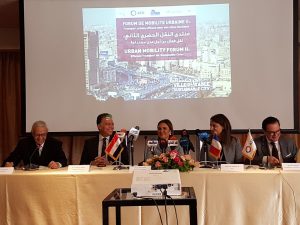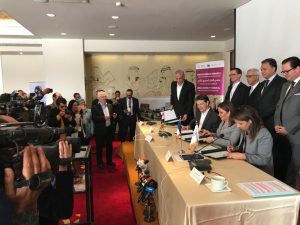[REPORT] Urban Mobility Forum in Egypt : Efficient Urban Transport for Sustainable Cities
AFD,
CODATU and CEREMA organized the 2nd Urban Mobility Forum under the title “Efficient Urban Transport for Sustainable Cities”. The Forum was dedicated to the integration between urban planning and transport, in particular through innovative mobility solutions. The workshop was organized in close collaboration with the Egyptian partners and with the participation of His Excellency the Minister of Transport, Her Excellency the Minister of Investments and International Cooperation, His Excellency the French Ambassador to Egypt, local and national stakeholders and companies, policy makers, top level representatives of the Ministry of Transport, representatives of private and public associations and universities, as well as international experts.
 The Efficient Urban Transport for Sustainable Cities Forum gathered stakeholders of the transport sector in Egypt involved in the management, operation and financing of urban transport networks with the objective of promoting discussions between the Ministry of Transport of Egypt and its associated entities (from Great Cairo and Alexandria in particular), experts and French companies and explore tools and solutions to address urban mobility challenges. The ultimate goal was to come-up with appropriate,concrete and implementable solutions to plan and expand the Egyptian urban transport network.
The Efficient Urban Transport for Sustainable Cities Forum gathered stakeholders of the transport sector in Egypt involved in the management, operation and financing of urban transport networks with the objective of promoting discussions between the Ministry of Transport of Egypt and its associated entities (from Great Cairo and Alexandria in particular), experts and French companies and explore tools and solutions to address urban mobility challenges. The ultimate goal was to come-up with appropriate,concrete and implementable solutions to plan and expand the Egyptian urban transport network.
An event with insightful discussions
Considering the Egyptian context, the Cairo 2nd UMF focused on the planning and financing of the urban transport network expansion projects, and analyse together with national and local stakeholders concrete measures and actions.
The workshop was broadly organised in 2 sessions :
- Session 1: Challenges in planning and financing urban transport in main Egyptian cities: Institutional framework and urban complexity
- Session 2: Processes and examples of urban transport network development
The forum started with the analysis of the challenges in the Egyptian context of planning urban transportation, as coordination between different authorities, and with the presentation of practical exemples of network expansion projects. After having highlighted the difficulties, it was possible to seek possible implementable solutions in planning and expanding more effectively the Egyptian urban transport network.
Discussions
The integration between urban planning and transport is a crucial issue for Egyptian cities which are experiencing a rapid demographic and urban growth considering that population is growing by 2 to 2.5 million people per year. Eng. Ashraf Abu Krisha, Vice-Chairman of the National Authority for Tunnels, explained that Greater Cairo’s transportation system currently has a daily ridership of 25 Million trips, and it is expected to increase to 35 Million trips by 2022, representing about 9 Million trips by Metro. In addition to Line 1 upgrade and Line 3 extension to the Cairo International Airport, Greater Cairo Metro envisages three more metro lines as well as an electric Light Rail Train that will connect the metro Line 3 with the New Capital. In Alexandria, NAT will implement the Raml Tramway rehabilitation project that was presented by Eng. Magdy Gaber, Alexandria Passengers Transport Authority APTA Vice ChairmanDuring the discussions, speakers stressed the importance of involving the private sector in new urban transport projects. Eng Mohsen Sabra, Mwasalat Misr CEO, presented the bus service linking New Cairo and Cairo International Airport with Ramsis, Cairo Train Station.
Considering the rapid urban expansion Egyptian cities are experiencing, French experts analysed urban planning solutions that integrate mobility and could be adapted to the Egyptian context. Mr Gilles Bentayou from CEREMA introduced the Transit Oriented Development, or TOD, a planning concept that aims at improving public spaces quality offering a diversity of housing programs and a mixed-use approach. Eng. S. Metwally from GCTRA enquired CEREMA about the essential criteria that the administration shall consider to implement TOD successfully. Mr G. Bentayou suggested to pay a strong attention to criteria, such as density, compactness, mixed-uses and pedestrian-friendly design.
The exchange with the Egyptian authorities’ representatives let the audience understand that companies struggle in dealing with too many institutional parties. During the discussions, experts and participants agreed that Greater Cairo Transport Regulatory Authority (GCTRA) would act as the entity leading transport regulation in the GC region, under the supervision of the MOT. Effectively, GCTRA has never started to be operational and the MOT should facilitate its institutional improvement by proposing actions to empower it. In this sense, Mr. Yves Amsler from UITP invited Egyptian authorities to develop a trans-institutional short-mid-long term holistic vision of sustainable urban mobility with urban rail as a backbone.
Egypt and France share many common urban challenges, such as centralization and a dynamic demographic growth. Mr Camille M’jati, from ARTELIA Ville & Transport presented the Grand Paris Express (GPE) project which will provide transportation for 2 million travellers per day. Mr. Olivier Badard from RATP Dev, explained that transport infrastructure has to be considered as an urban regeneration tool that can finance whole or part of the needed transport infrastructure upgrades. Mr. O. Badard reminded the audience that RATP DEV have signed a memorandum of understanding (MoU) with NAT to Operate and Maintain Line 3 and other future rail lines of Cairo.
Mr. Y. Amsler explained that, for urban transport networks expansion, connections and coordination are objectives as well as challenges for attractive, affordable and efficient cities. LRT and BRT are different components, sometimes complementary, of a balanced network and administrations require preliminary studies and data to define the appropriate choice. Dr Amr Shaat, Assistant of HE Minister of Transport, agreed with him and said that the Ministry will take into account all the precious presentations of the speakers and work on it
During his concluding speech, Prof. Dr. A. Huzayyin highlighted that transport projects have to be seen in the long term and have to be conceived step-by-step to allow their correct implementation. Mr J. Helluin stated that given these challenges and the local context, it seems necessary today to relaunch and accelerate the implementation of new solutions and projects. Mrs Gaelle Letilly, AFD Cairo Deputy of Director, explained that about one-third of AFD portfolio in Egypt is dedicated to the urban transport. With this Forum, AFD wanted to discuss planning transport network extension as this issue is crucial for all cities in the world, and it is of particular interest to Egyptian cities which are experiencing a rapid demographic and urban growth. Lastly, Dr. A. Shaat stated that all solutions that are discussed during the Forum are applicable for all Egyptian cities and not only to Cairo and Alexandria and he invited governorates to take advantage of the results of the UMF.
Signature of a Technical Cooperation Agreement in Favor of the Transportation Sector
 During the event, HE the Minister of Investment and International Cooperation Dr. Sahar Nasr, AFD’s Cairo Office Director Mrs. Stephanie Lanfranchi, and CODATU’s Executive Manager Mr. Jean-Jacques Helluin signed a technical cooperation agreement in the urban transportation field through FEXTE partnership grant worth EUR 500.000 to provide a technical support in favour of the Ministry of Transport. The technical cooperation agreement signature took place in presence of HE the Minister of Transport Dr. Hesham Arafat,
During the event, HE the Minister of Investment and International Cooperation Dr. Sahar Nasr, AFD’s Cairo Office Director Mrs. Stephanie Lanfranchi, and CODATU’s Executive Manager Mr. Jean-Jacques Helluin signed a technical cooperation agreement in the urban transportation field through FEXTE partnership grant worth EUR 500.000 to provide a technical support in favour of the Ministry of Transport. The technical cooperation agreement signature took place in presence of HE the Minister of Transport Dr. Hesham Arafat,The agreement aims to enhance commercial exploitation of metro, tramway and rail stations in Cairo and Alexandria, besides supporting the operation and maintenance management to decrease operational costs. This is in addition to improving the physical integration between various means of transportation and enhancing capacities of the Greater Cairo Transport Regulatory Authority and the public transportation system in Cairo and Alexandria.
During the technical cooperation, a plan will be carried out to improve the integration design of Cairo metro and Alexandria tram stations, auditing the design of two interchange stations on the third line of the metro, along with the design and implementation of a training program to raise the efficiency of workers in the Cairo metro.
This cooperation, funded by AFD through a financial tool called FEXTE – Fund providing Technical Expertise and Exchange of Experience – , aims at supporting local bodies initiatives and promote knowledge sharing. Training, capacity building and institutional structuring will be at the heart of the activities. In this context, several workshops will be organized to follow up with the Urban Mobility Forums’ discussions and highlighted challenges.
In both Forums, Egyptian participants expressed the need of workshops, training and technical visits in order to respond to staff requirement to better deal with management and operation tasks and the many experts offered their companies’ help. In this sense technical visits in Europe may be organised as well as a specific studies on planning interchanging metro stations.
